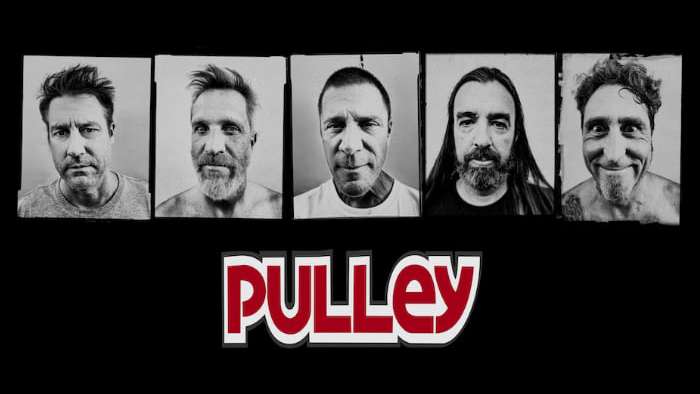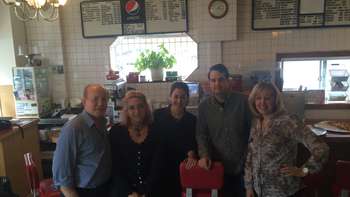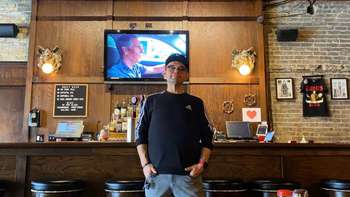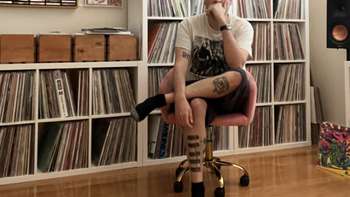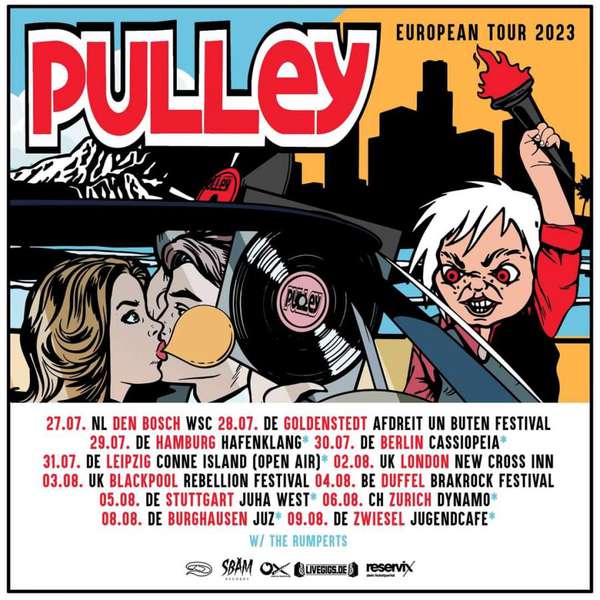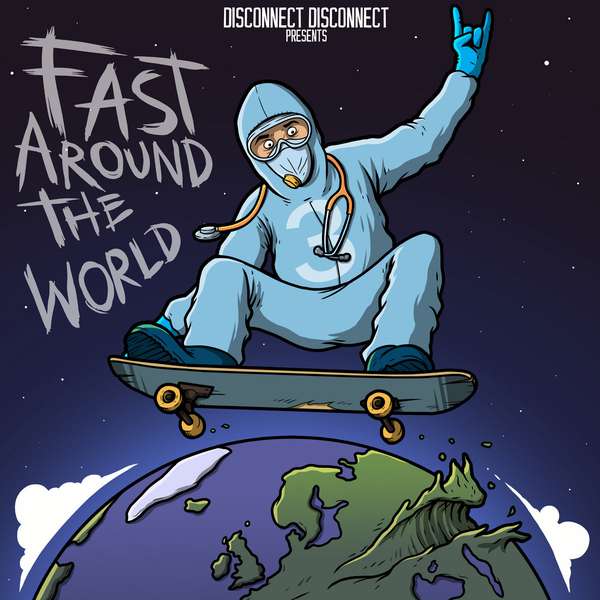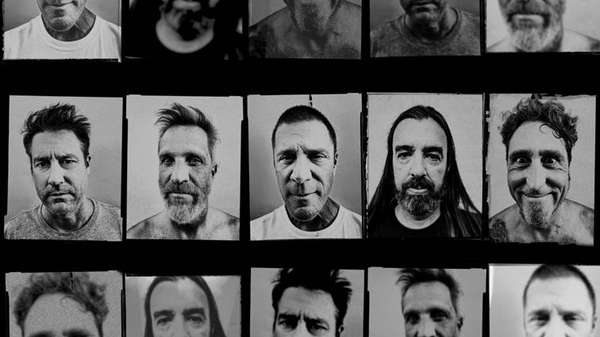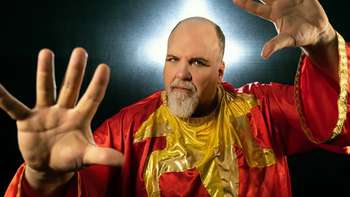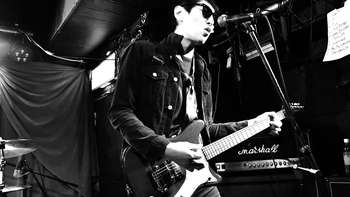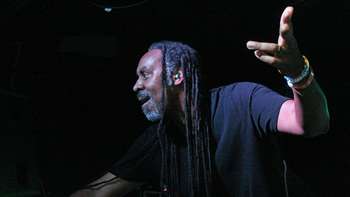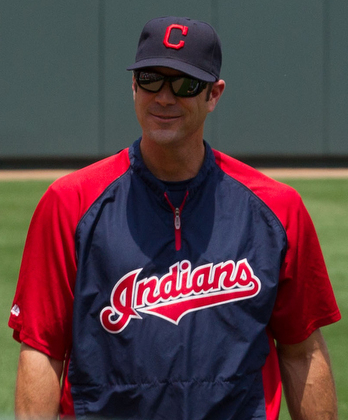
Most musicians have day jobs – and not just to pay the bills. Jobs provide new challenges, personal fulfillment and, yes, some rent or gas money. And usually when somebody is writing a new record or scheduling a tour, they have to balance that with their job.
How an artist spends their time by day will influence the creative process at night. In Don’t Quit Your Day Job, Scene Point Blank looks at how musicians split their time, and how their careers influence their music or – sometimes – how their music provides escape.
In this edition, we chat with Scott Radinsky of Pulley, who splits his time in an equally road-weary industry: professional baseball. Pulley just released a new album, The Golden Life (SBÄM Records) this spring.
Scene Point Blank: You're currently between jobs, which is pretty symbolic of the nature of being in professional baseball in some ways. As I said to the PR who put us in contact, there are only a few of these jobs in the entire world at this level. That said, on a resume or whatever, what do you list as your job title or profession?
Scott Radinsky: When I list my job as a profession I list professional coach, crazy thing is I’ve never put together a resume, in that line of work it really is who you know and what you’ve done, I am not sure it’s a job where you fill out an application.
Scene Point Blank: And, for those unfamiliar with it, can you list your professional background a bit here. A couple of recent job titles, etc.
Scott Radinsky: My background is 35 years of being involved as a professional either playing or coaching. I played for a total of 17 years in the minor leagues and major leagues and then got into coaching a year after I finished.
My recent job titles have been a special assistant to an organization, instructor, pitching coach, or bullpen coach.
Scene Point Blank: You were a Major League Baseball pitcher and then coach. Tell us a bit about your career path from college, through the minors/MLB, and what happened between playing and coaching. Was it always baseball? Did you consider other professions?
Scott Radinsky: I was signed out of high school in ’86. I went on to play for 17 years, most of them at the major league level. I spent a few years in the minor leagues working my way up the ladder.
After playing I was offered a position with the Cleveland Indians as an instructor to rove around the minor leagues and evaluate players in the organization. From there they asked me to get back on the field in a full-time role as a coach and then I just stuck with it moving up the ladder again ultimately reaching the big leagues as a coach as well.
There has never been any other job I have considered exploring up to this point in life.
Scene Point Blank: Pitching in the big leagues is an exceptionally unique job itself. But I want to focus a little more on the present. When did you know you wanted to move into coaching?
Scott Radinsky: I’m not sure anyone sets out to be a coach initially. It just kind of happens if you have a passion for the game and like to teach. [It] Being a major part of my life and giving so much to my family and I, the natural thing for me was to give back to a game that gave to me. So that’s what I did.
I think towards the end of my playing days I found myself in a veteran role where I was kind of mentoring younger players to make the transition to the big leagues. That’s when I started to realize I enjoyed doing that and thought I would at least continue in baseball at some capacity.
Scene Point Blank: Did you have any other jobs along the way that made you know baseball was the "day job" for you?
Scott Radinsky: No other jobs. Pretty fucking lucky, huh?
Scene Point Blank: What is the hardest part of the job: collaboration, the schedule, media or just the constant pressure/attention?
Scott Radinsky: The job or game, depending on how you want to view it, is not really hard as much as demanding on you.
It’s an 8-month grind where you pretty much check out of life and go all in for that period of time without any days off. Not too many other jobs require that sort of commitment, travel etc. There are a lot of different components that make it tough but, at the end of the day, it’s still a game and I always tried to think of that when things got a little rough to remind me it wasn’t a job and how lucky I was to be able to do it and make money, crazy!
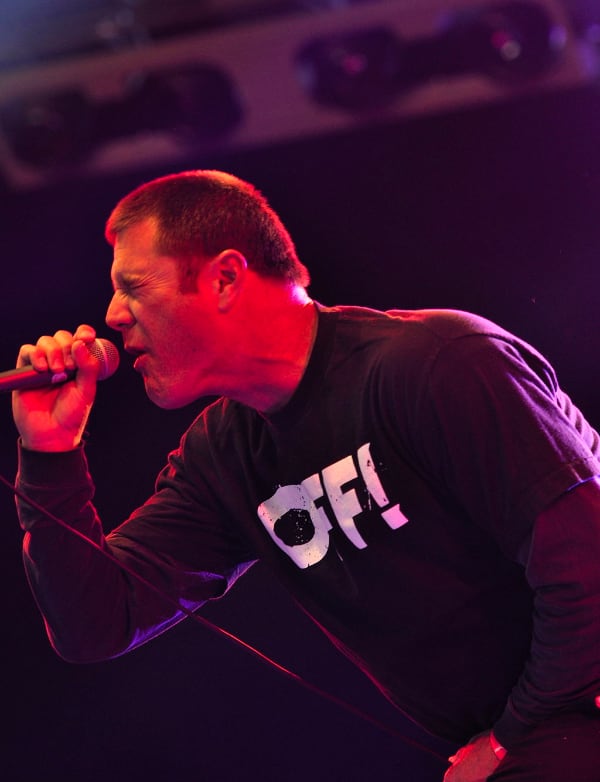
Scene Point Blank: What is the most rewarding part of the job?
Scott Radinsky: I think the most rewarding is being able to make an impact on someone’s career and see them have success. It’s nice to have experience and be able to pass that on to the future players.
Scene Point Blank: This interview is about jobs, but also how it mixes with music. When did you first become serious about being a musician and, in comparison, when did you realize baseball could become something more than a hobby/interest?
Scott Radinsky: I think we became serious about music somewhere in the 10th grade. We were playing a lot locally around LA and it was becoming good for us. We started to tour while still in high school and the music was being heard around the country.
As far as baseball, it started happening around the same time, 11th grade to be exact. I just started to find myself as a pitcher and was starting to have some success so I pushed myself pretty hard to become better. Once I graduated and was signed out of high school it became serious.
Scene Point Blank: Were you in bands when you realized you might also have a career in pro sports ahead of you?
Scott Radinsky: I was doing both simultaneously and doing a good job of juggling life at the time.
Scene Point Blank: Did you ever feel like you had to choose between music and sports?
Scott Radinsky: I never felt like I had to choose between the two, nobody ever pushed me to or made me feel guilty. Like mentioned previously, there was a lot of support from both sides friends and family so it made it easy to continue pushing at both.
Scene Point Blank: The minor leagues are maybe the best analogy I can think of to the hardships of being a DIY band. It's a very rough, always-on-the-go lifestyle. Did you play with Pulley or other bands during that period?
Scott Radinsky: I’ve played music since I was in the 8th grade so being in a band and playing baseball has really ever been the only two things I’ve done for a “job” my whole life. We have managed to play every year some sort of live shows, record, tour, etc. since 1984 and baseball has been traveling along the way with it the whole time as well.
Scene Point Blank: Did your teammates or management ever discuss music with you, specifically the aspect of playing music versus a more general "what do you like" kind of thing?
Scott Radinsky: Most of the time while at the field it was usually baseball talk. When we would talk about music there wasn’t much conversation about punk rock because not very many of them really understood that kind of music until somewhere around the mid ‘90s when it became a little more accessible. But I would usually keep to myself my personal opinions of what I thought about commercial music or whatever they were listening to.
Scene Point Blank: Did management or your bosses ever try to talk you out of playing music, suggesting it was too many late nights or a conflicting lifestyle, etc.?
Scott Radinsky: Not that I can remember. As long as you come to the field every day to do your job they don’t really get too involved in your personal life.
Scene Point Blank: That's enough with the negative questions. Have you ever had a teammate or opponent know your band before they knew you as a player/coach?
Scott Radinsky: Yes, it’s happened several times.
I have had teammates that have come to shows, players I’ve coached come to gigs, as well as a general manager of a MLB team in the pit during one of our shows. So, yeah, I guess they knew.
Scene Point Blank: How does the job affect your creative work or schedule with the band? (I imagine it's easier to play shows or practice in the winter, for example.) How does that affect how you write, rehearse or record?
Scott Radinsky: It’s usually been a positive. Even though the annual baseball schedule is long, there is a lot of down time which allows for writing. [Plus,] the experiences and different people met along the way always offer something to write about.
I do enjoy the offseason because that was when we would finally get to play.
Scene Point Blank: Does such a high-profile job affect your bandmates?
Scott Radinsky: I’m not sure. That would probably be a better question for them. Hopefully, from my standpoint, it doesn’t affect them at all.
Scene Point Blank: Has your work influenced any specific songs you've released?
Scott Radinsky: Almost all of the songs I write are related to something I’m living through at the time so I guess the answer would be yes.
Scene Point Blank: As a baseball fan I feel like sports are a weird world where fandom wants people to "do their job 24/7". Did you ever encounter "why do you have outside interests" arguments?
Scott Radinsky: No, not yet. Most people seemed to genuinely support what I’ve done.
Scene Point Blank: Social media and the connection between athletes and the fan base is hitting new levels. Do you think that athletes have more opportunities for personal interests now than when you played in the '90s? Does that extend to coaches?
Scott Radinsky: Yes it certainly has brought more of a connection with Twitter, Instagram, etc. I imagine it’s extended to anyone involved if a fan has interest in what they're posting? I personally have no social media so it was not something I have been involved in but I do know some who have followers and post content regularly.
Scene Point Blank: Anything you'd like to add?
Scott Radinsky: Thanks for the time and reading this. Check out new music if you can and get out to support bands who play live. Also, get out to your local field whether a minor league park or major league and support the players and appreciate the work put into what they do.
--
Check out previous entries in the Don’t Quit Your Day Job series.
